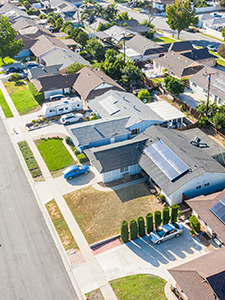POST TAGS
Blog posted On September 17, 2020

Buying a home, especially your first home, is a lifechanging event and a big financial investment. You know buying a home will come with the upfront costs of the down payment and closing costs, but do you know about all of the ongoing financial implications? Buying a home impacts your credit score, your savings, and your tax bill, but it also becomes a vehicle for you to build wealth in the form of home equity.
If you’re buying a home this year, don’t forget to factor in these four major financial changes.
Your Credit Score Will Drop … At First
You worked so hard to improve your credit score before you bought your home, and now it’s going to go down. Buying a home can cause your credit score to drop by anywhere from 10 to 40 points, because you are taking on new debt, and it’s a significant sum. If you make your payments on time, your credit score will recover, and even improve over time. A missing or late mortgage payment can have a much more detrimental impact on your credit score than a missed or late rent payment. Make sure you pay on time by setting up automatic payments with your bank or using a monthly calendar notification.
Maintenance Costs are Up to You
When you rent, the cost of maintaining your home is your landlord’s responsibility. When you are a homeowner, the cost is yours. Home inspections are so important because they can help you identify any maintenance that will be coming down the road, and whether you want to take that on. A home with an aging plumbing or HVAC system, for example, could mean a big repair bill for you in the next couple of years. However, a home with a recently replaced roof or upgraded appliances means you are off the hook for replacing those, at least for now.
Your Savings Will Take a Hit
Even low-down payment mortgage loans will come with closing costs, moving expenses, and as mentioned before, some maintenance and repair projects. Lenders look at your savings and cash reserves to make sure you are ready for both the home purchase and the ongoing cost of homeownership. Homeowners can expect to spend an average of $2,000 per year on needed repairs. If you find yourself facing a large project down the road, a cash-out refinance is one option to reinvest in your home.
New Tax Benefits
One of the benefits of homeownership is the tax deductions. Eligible deductions vary from state to state so you will want to talk to a tax professional or financial advisor to make sure you are recouping all of your benefits.
Buying a home is more than just a change of address, it comes with big financial changes. If you have any specific questions about buying a home, let us know.
Sources: Money.com